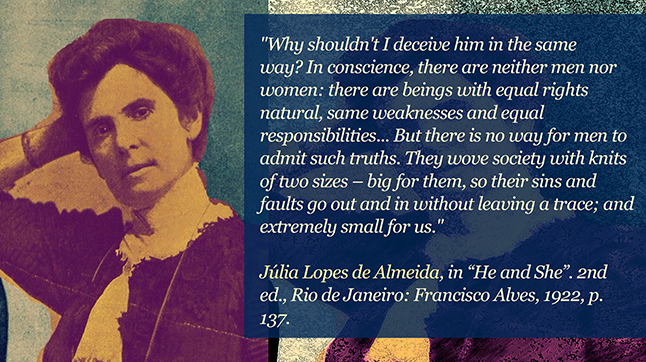Co-founder of the Brazilian Academy of Letters, but wronged
Planning for the Academy began shortly after the Proclamation of the Republic (1889), on the initiative of a group of intellectuals. Júlia Lopes was the only woman. In an article in the newspaper O Estado de S. Paulo, Lúcio de Mendonça considered it fair to offer the writer a chair at the Academy. This did not happen because, according to the intellectuals who opposed it, there were no women in the Académie Française de Lettres, which served as an inspiration for the Brazilian Academy. A poorly disguised machismo.
Denying the role and emancipation of women, ABL granted a place in the group to the writer's husband, Filinto de Almeida, to occupy chair number 3, which would be hers. He came to be called an academic consort. Only in 1977, 80 years after the foundation, Rachel de Queiroz (1910-2003) was elected the first woman to the Academy.
In 2017, after 120 years, ABL honored Júlia Lopes Conference cycle Cadeira 21, and recognized the injustice suffered by her.
Criticism of the social situation in Brazil, in her novels the author used to represent society from various perspectives through plots, plots and intrigues in which she prints her own political, ideological and religious positions. of the moment portrayed.
Differing from the male writers of that period in relation to the prominent issues in her work and the vision she applies to them, Júlia Lopes left a rich legacy in the sense of portraying society from the abolition of slavery until the 1930s
The situation of women in the literature of her time
Júlia Lopes was considered a writer with advanced ideas for her time. She advocated the abolition of slavery, the republic, divorce, the formal education of women, the emancipation of female bodies, and civil rights. With the classic text and ahead of her time, she inserts different points of view in her works and represents women and the difference in treatment given to them by society.
A very diverse author, she wrote novels, short stories, chronicles, essays and plays during a time when women who aspired to any profession, in addition to taking care of the home, were explicitly ignored - or else, simply replaced by men.
Women, throughout history, have created, acted, written and produced beautiful works in the most diverse areas of human knowledge. However, times were even more difficult and conservative. Protagonism always ended up in the hands of their husbands or teachers.
According to the Darkside Publisher, the abolitionist held numerous lectures throughout her life in order to make women aware of their emancipation roles in the misogynist society of the time.
Júlia became one of the most published writers during the period of the First Republic (1889-1930). This success gave her visibility and the publication of several articles and materials that addressed equal rights between genders.
Knowing the story of Júlia Lopes de Almeida is to understand and realize that vestiges of sexism rooted in our society are still present in the journey of countless women who struggle to conquer their spaces.
From the 1970s onwards, Júlia Lopes and other forgotten authors were rediscovered, especially in the academic environment, in studies and research in the areas of Letters and Social Sciences.
Contemporary Literary Schools by Júlia Lopes de Almeida
Originating
in France, Realism is the literary
school that analyzes the reality of the time lived by the author. In Brazil, it
appears after Romanticism and before Symbolism, comprising the years 1881 to
1893 – the same period in which Naturalism
and Parnassianism also occurred.
Marked by objectivism, veracity and social denunciation, Brazilian Realism
begins with Machado de Assis Memórias
Póstumas de Brás Cubas (The Posthumous Memoirs of Bras Cubas), published in
1881.
Parnassianism – literary movement that emerged at the
same time as Realism and Naturalism, at the end of the 19th century. Of
classical influence and tradition, it has its origins in France. It is based on
the cult of form, impassibility and impersonality, universalist poetry and
rationalism.
The
innovative proposal was a poetry with an elaborate, rational and perfect
language from the formal point of view. They believed that, if the classical
model supported them, they could counteract the exaggerations and fantasy
typical of Romanticism.
Naturalism – also emerged in France, it was an
artistic and cultural movement that manifested itself in literature, theater
and plastic arts. Its main characteristics are objectivity, impersonality and
the faithful portrayal of reality.
The movement was influenced by scientific and philosophical currents that emerged in Europe such as determinism, Darwinism and scientism. For naturalist artists, everything was determined and had a logical explanation based on science. Thus, an art of social denunciation emerges, focused on the themes of poverty, inequalities, power struggles and social pathologies.
In Brazil,
the naturalist movement began in 1881 with the publication of the work O Mulato (the mulatto), by Aluísio de Azevedo. In Portugal, the
movement emerged in 1875 with the novel O
crime do Padre Amaro (Father Amaro's crime), by the writer Eça de Queiroz.
Literary characteristics of Júlia Lopes de Almeida
Júlia Lopes de Almeida is associated with realism and naturalism. Therefore, his best-known work — A bankruptcy (1901) — is marked by objectivity, criticism of Brazilian society, the theme of adultery and determinism.
It is possible to find in his works the following characteristics:
Objectivity - in opposition to sentimentality.
Anthropocentrism - appreciation of reason.
Criticism of Brazilian society.
Appreciation of the present moment.
Presence of the theme of adultery.
Scientism - exaggerated use of scientific theories in character analysis.
Determinism - influence of the environment, race and historical moment on the characters.
Biologism - the behavior of characters is associated with biological causes.
Zoomorfization - attribution of animal characteristics to humans.
Pioneering in Children's Literature
pioneer in children's literature in Brazil, her first book, Contos Infantis (1886), was a collection of 33 texts in verse and 27 in prose intended for children, written in partnership with her sister, Adelina Lopes Vieira.
Bankruptcy, the work well recognized by critics
Francisco Teodoro, a Portuguese residing in Brazil, manages to become rich, with a lot of work and effort. He later marries the beautiful but poor Camilain an arranged marriage, as was common at the time. The couple has four children: Mário, Ruth, Lia and Raquel.also lives in her house, Nina, 's niece Camilaan aggregate who takes care of organizing the house.
Workaholic Francisco Teodorodoesn't realize that Camila, his wife, has an extramarital affair with a doctor, Doctor Gervásio. In this relationship, Camila seeks the affective-sexual satisfaction that she does not find in marriage, and she does not feel guilty. She sees herself on an equal footing with her husband.
The situation gets complicated when Francisco Teodoro makes a mistake in his business and loses everything. Unhappy, he commits suicide. Back in poverty, Camila 's humble home Nina, given to her by Francisco, was still alive. The narrative focuses on the female characters, as they are strong and can survive without male support. Feminine autonomy is suggested, without, however, deepening the theme. The work presents traces of naturalism, centered on determinism (influence of environment, race and historical moment).
Biography
Júlia Lopes de Almeida, daughter of wealthy and educated Portuguese, was born on September 24, 1862, in Rio de Janeiro. When she was still a child, she and her family moved to a farm in Campinas, in the state of São Paulo. The writer received a liberal education and, with the support of her father, at the age of 19, she was already writing for A Gazeta de Campinas, an unusual intellectual activity for women at the time.
In 1886, the author moved to Portugal and there she met her husband, the poet Filinto de Almeida. He launched the book Contos Infantis, in 1887, alongside his sister, Adelina Lopes Vieira. In the same year, he published his first book for adults — Traços e Iluminuras. In Brazil, she wrote for several periodicals, an unusual activity for women at the time. She was the only woman among the creators of the Brazilian Academy of Letters, despite having been prevented from occupying a chair at that institution.
He has written for periodicals such as A Mensageira, Única, O Quinze de Novembro, Kosmos, O País, A Gazeta de Notícias, A Semana, Jornal do Comércio, Illustrator Brasileira, Tribuna Liberal and Brasil-Portugal. She also gave lectures on the place of women in Brazilian society and other national issues.
He died in Rio de Janeiro on May 30, 1934, a victim of malaria, possibly contracted on his recent trip to Africa. She left an extensive work of female authorship that was not only literary, but also historically significant.
Who is who
Used and suggested links
A Falência - Tatiana Feltrin ֎ Quem foi Julia Lopes de Almeida
Mulheres da literatura ֎ Editora do Senado lança Ânsia Eterna
nsia eterna - Júlia Lopes de Almeida ֎ A falência - leio, logo escrevo














